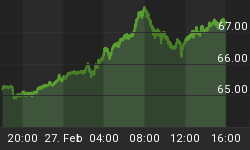One of the immediate financial consequences of the catastrophic Japanese earthquake is that Japan needs to call on its huge cache of foreign exchange reserves to rebuild its shattered infrastructure. To pay for domestic projects, Japan will require yen - not dollars, euros or Swiss francs. As a result of these conversions, the yen rallied considerably after the quake struck.
But a surging yen runs counter to the macro-economic currency plans favored by most global economists. In order to maintain Japan's position as a net-exporter of manufactured goods and net-buyer of US debt, the yen needs to stay down. So, the G-7 group of the world's leading economies has intervened in the foreign exchange market by selling yen holdings, thereby pushing the currency down. In the short-term, their efforts appear to have been "successful," with the yen dropping sharply today.
Theoretically, this action is being taken to preserve export earnings, but this is only a secondary effect. Primarily, in making this move, the G7 is saying that the key to rebuilding Japan's earthquake-ravaged economy is to raise the price of everything it needs to buy.
After all, absolute purchasing power is far more important than nominal export earnings.
When the yen gains in strength, Japan earns more dollars from its exports, which could now be used to purchase the raw materials necessary to rebuild its infrastructure.
However, by weakening the yen, Japan earns fewer dollars for its exports, increasing the economic burden of reconstruction.
Conventional wisdom is that a weakening currency is a boon for economic growth and exports; however, history does not support this view.
For example, during the 20-year period from 1971 to 1991 - often referred to now as an economic miracle - the Japanese yen tripled in value against the dollar, an average appreciation rate of about 10% per year. This increasing purchasing power enabled the Japanese to enjoy steady economic growth and rising living standards.
Over that time, Japan's GDP grew at an average rate of 4.5% and net exports increased fivefold. Government debt as a percentage of GDP fell slightly to about 20%.
Over the following 20 years, from 1991 - 2011, the Japanese economy has been dead in the water. Yen appreciation slowed considerably, with the currency rising by approximately 50% against the dollar, or about 2.5% per year. However, over that time, the Japanese economy and net export growth essentially stagnated, with GDP growing by less than 1% per annum and government debt exploding to over 120% of GDP.
The real problem for Japan is that in the aftermath of the bursting of the stock and real estate bubbles, the Japanese government refused to allow market forces to repair the damage. Instead, it based its foolish approach on restricting the rise in its currency to maintain exports to the United States. In this cart-before-the-horse worldview, Japan assumed its economic growth was a function of its exports. In reality, exports flow from economic growth.
So, in order to engineer an export-led recovery, Japan embarked on an era of central government planning, Keynesian style pump-priming, and nearly endless quantitative easing. The result was disaster. The only bright spot was that the underlying strength of the Japanese economy kept a lid on consumer prices despite all the inflation deliberately created by the Bank of Japan. So even while good jobs have become harder to find, ordinary consumers have had the benefit of falling prices. It is ironic that Japan's "deflation" is cited as the primary cause of its malaise. If Japan's economy had been less efficient, its 20-year malaise would have been accompanied by increasing consumer prices, a.k.a. stagflation. This would have caused much more suffering to the Japanese people.
Still, as a result of its enormous economic policy errors, much of Japan's efforts over the past 20 years have benefitted Americans rather than its own citizens. A tremendous share of their purchasing power was transferred across the Pacific, helping to inflate a bubble economy in the United States. Of course, as the Japanese economy struggled beneath the weight of this massive American subsidy, it gradually passed the baton to China, which for the same foolish reasons was happy to run with it.
The unfortunate reality is that the Japanese government is doing more economic damage to Japan than the earthquake and tsunami did. This new round of inflation will overwhelm the ability of the Japanese economy to offset upward pressure on consumer prices.
Combine that with the lost output associated with the quake and the expense of reconstruction, and it becomes evident that inflation will soon become a major threat to Japan.
As this realization forces interest rates higher, the cost to Japan of servicing its massive government debt will be crushing.
There is still time for Japan to rethink its self-destructive monetary policy, let its currency rise, and allow its economy to recover. If they do, the US will experience its own disaster as the dollar tanks.
Peter Schiff is CEO of Euro Pacific Capital and host of The Peter Schiff Show.
Subscribe to Euro Pacific's Weekly Digest. Receive all commentaries by Peter Schiff, Michael Pento, and John Browne delivered to your inbox every Monday.
Be sure to pick up a copy of Peter Schiff's just-released economic fable, How an Economy Grows and Why It Crashes. Click here to learn more and order.















